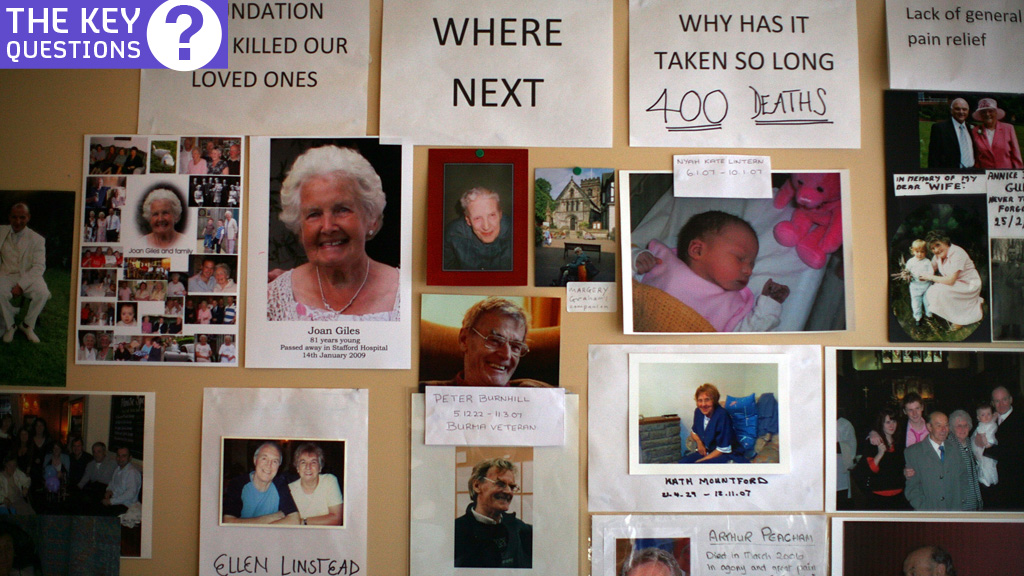Mid Staffordshire scandal – the key questions
As Robert Francis QC publishes a long-awaited report into failings at the Mid Staffordshire General Hospitals Trust, Channel 4 News answers some of the key questions on the scandal.

Why is there a public inquiry?
There were “appalling standards” in the NHS foundation trust putting patients at risk, according to the Healthcare Commission. In 2009, it published the findings of an investigation which revealed a catalogue of failings, including that from 2005 to 2008, between 400 and 1,200 more people died than would have been expected for a three-year period.
A local campaign group, Cure the NHS, spearheaded calls for an inquiry. Led by Julie Bailey, whose mother, Bella, died at the hospital in 2007, the group was supported by the Patients Association.
The previous government ordered two Department of Health investigations, and then an inquiry led by Robert Francis QC. But it lacked legal powers, and focused on problems at the hospital, not on wider failings.
After it came to power, the coalition government ordered a full public inquiry under Mr Francis which would have legal oversight and which was charged with looking into failings by the various bodies and regulators involved.
The inquiry, held at Stafford borough council’s offices, will report on why serious problems at the trust were not identified and acted upon sooner.
What actually happened there?
After conducting more than 300 interviews and examining more than 1,000 documents, the Healthcare Commission identified numerous serious failings which eventually led to this inquiry.
As well as the deaths, it found inadequately trained nursing staff, and too few of them. Junior doctors were left alone in charge at night, and patients were left without food, drink or medication for days at a time as their operations were repeatedly cancelled.
The commission said that some patients were left in pain or needing the toilet, and some were sat in soiled beddnig for several hours at a time. They were not given their regular medication.

It also said that receptionists with no medical training were expected to assess patients coming into A&E, even when some needed urgent care. One patient with an open fracture of the elbow waited for more than four hours covered in blood, with no pain relief.
Essential equipment was often not available or working. And few patients were given the drug Warfarin to help prevent blood clots, despite deep vein thrombosis being a major cause of deaths in patients following surgery.
The commission said that although it is not clear how so many deaths could have been avoided, patients undoubtedly suffered as a result of lapses in the standard of care.
It added that the trust board was more concerned with finance, targets and achieving foundation status, with little evidence that poor standards of nursing care were identified or discussed.
How much does the inquiry cost?
So far, the inquiry estimates that it has spent £13,034,300.
In total, the inquiry heard from 164 witnesses in person. There were 87 witness statements, and 39 provisional statements were “read” into the inquiry’s record
It was announced by then health secretary, Andrew Lansley MP, in the House of Commons on 9 June, 2010. Hearings began on 8 November of that year, and concluded on 1 December 2011.
Could the scandal happen again?
Although such inquiries are indirectly intended to prevent repeats of events, in reality, the maximum that anyone can do is a damage limitation exercise.
With the conclusion of the public inquiry, there will be recommendations on courses of action which should be taken to stop it from happening again, and campaigners hope they will be acted upon.
But even Antony Sumara, the former chief executive of Stafford Hospital, has said: “There have been lots of other inquiries which have come up with similar recommendations and they’ve not been implemented.”
Peter Carter, chief executive of the Royal College of Nursing, has also warned: “Will there be another Mid Staffs? Yes, sadly there will be.”
The reasons for scepticism are exacerbated by fears over whether cuts will have an impact on safety.
In addition, as Mr Carter said, “there are 1.2m people employed in the NHS and there is a hospital in every town”.
What happens next?
As well as the recommendations, Sir David Nicholson, the chief executive of the NHS, has apologised for the failings.
He said the NHS had “let people down in themost devastating way“.
He said patients would be given “much more clout”, and that more information on failing hospitals should be made public.
But given that he was chief executive of Shropshire and Staffordshire Strategic Health Authority in 2005 and 2006, he may well face calls for his resignation.
The Health Secretary, Jeremy Hunt, is also likely to face tough calls to implement robust action.
But in an indication of how seriously the government is taking the issue, David Cameron will make a statement on the findings, not Mr Hunt.